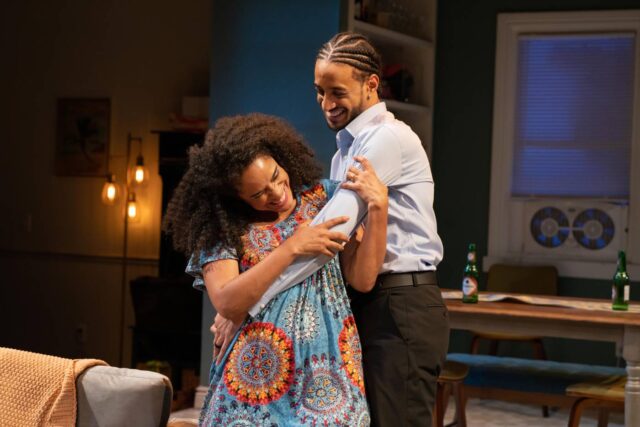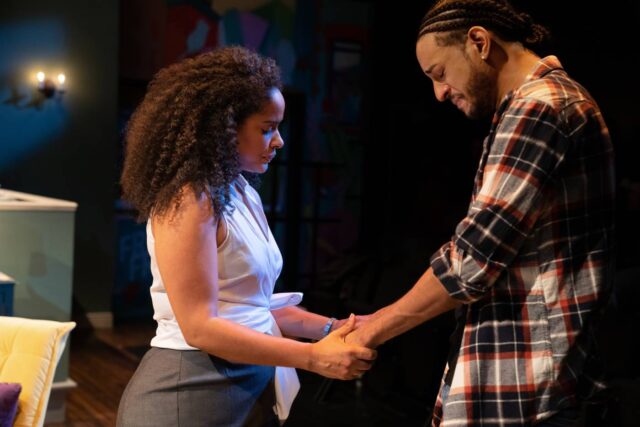
Maribel Martinez and Xavier Pacheco star in world premiere of Guadalís Del Carmen’s Bees & Honey (photo by Julieta Cervantes)
BEES & HONEY
MCC Theater
Susan & Ronald Frankel Theater
511 West Fifty-Second St. between Tenth & Eleventh Aves.
Through June 11, $54-$74
mcctheater.org
“Love me as I love you, good mommy / Give me your love without measure / Look for me like a bee to the honeycomb / Remove the sorrow / Drink the honey of my life,” Dominican musician and multiple Grammy winner Juan Luis Guerra sings in Spanish with his group 4.40 on his 1990 song “Como Abeja al Panal” (“Like a Bee to Its Honeycomb”).
The bachata hit serves as the inspiration for Guadalís Del Carmen’s bittersweet Bees & Honey, a coproduction of MCC and the Sol Project running through June 11. The 130-minute play (with intermission) is like a Latiné telenovela directed by Douglas Sirk, infused with the rhythms of the Dominican music genre known as bachata, exemplified by Guerra’s “Bachata Rosa,” which is playing when the show begins.
“Oh my god, I love this song. So romantic. I know, right?” Johaira (Maribel Martinez) tells the audience. Manuel (Xavier Pacheco) says, “Damn. This song takes me back. Man, I love me a good bachata. Bailao ahí, bien pegaíto like glue. Ain’t nothing like it.” A moment later, Johaira explains, “Bachata brought me and Manuel together almost eight years ago.” The opening is a prelude to what is to come: a flashback of those eight years.
Johaira is in a white bathrobe, sitting on a couch with her feet up. Manuel is in a chair off to her left. They talk to the audience individually, as if they are unaware the other is there as they share their origin story. Reza Behjat’s lighting switches spots on one and then the other. They interact directly with the audience; when Manuel sticks out his fist to bump with a gentleman in the first row, he waits for the man to reciprocate before continuing.

Johaira (Maribel Martinez) and Manuel (Xavier Pacheco) face tough times in Bees & Honey (photo by Julieta Cervantes)
Alternating between Spanish and English, Johaira and Manuel talk about what was going through their minds the night they met at a club near Dyckman St. in Washington Heights; the action then cuts to that encounter and follows the rest of their relationship chronologically. While the actors no longer address the audience directly, the connection has already been made.
Manuel, who has long, tight dreads and sometimes wears a doo rag, is a former drug dealer who is now a mechanic with plans to open his own shops in all five boroughs (“maybe a location in Staten Island,” he says tentatively). Johaira is a prosecutor working a high-profile case that she hopes will lead her to become chief deputy in a new sexual-assault division. Manuel likes playing online video games with his friends while Johaira tries to get him more interested in the rest of the world, beginning with having him read bell hooks’s The Will to Change: Men, Masculinity, and Love and teaching him about power structures.
As Johaira’s case approaches its conclusion, Manuel seeks loans for his business, and they plan to start a family, they encounter more and more roadblocks, some societal, some self-imposed.
Martinez (Black Joy Project, Will You Come with Me?) and Pacheco (The Tempest, Richard III) are terrific as the seemingly mismatched lovers; you can’t help but root for them even as Del Carmen (Not for Sale) heaps on the melodrama, throwing tragedy after tragedy at them that can’t be eliminated with a video game controller or a legal objection.
Shoko Kambara’s comfortable set is a kitchen and living room with a bookshelf, tchotchkes, window air conditioner, working sink, and silver fridge; part of the floor and two doors in the back are painted by Washington Heights artist and muralist Danny Peguero in bright colors, featuring graffiti-like characters and architecture, adding to the Dominican feel. (More of Peguero’s art is on view in the lobby.)
Director Melissa Crespo (Espejos: Clean, Native Gardens) uses the set to its fullest, although there is a lot of entering and exiting that grows tedious. Germán Martínez’s sound design warmly incorporates Dilson’s original score with the dialogue to maintain a compelling atmosphere.
Devario D. Simmons’s costumes help define the characters, from Manuel’s work shirt with his name on it to Johaira’s wardrobe — which shifts from all white to all black to a colorful island dress — while celebrating their bodies; a significant part of the show is dedicated to the couple’s appreciation of their physical beings. “Love watching you squeeze that ghetto booty into them fancy power suits,” Manuel tells Johaira. When Manuel explains that he will not wear skinny jeans, Johaira says, “Yeah, ya butt and thighs are too juicy for ’em.”
The soap-opera elements threaten to overwhelm the play, but Bees & Honey is a tasty confection filled with plenty of sting.